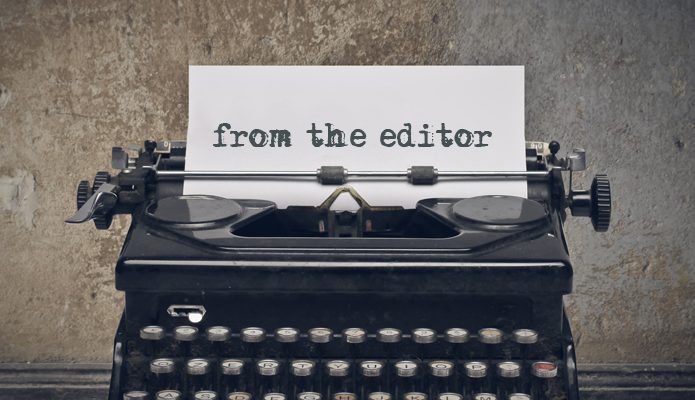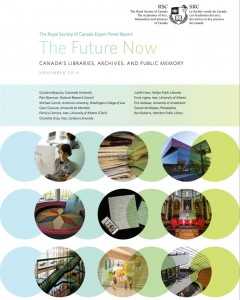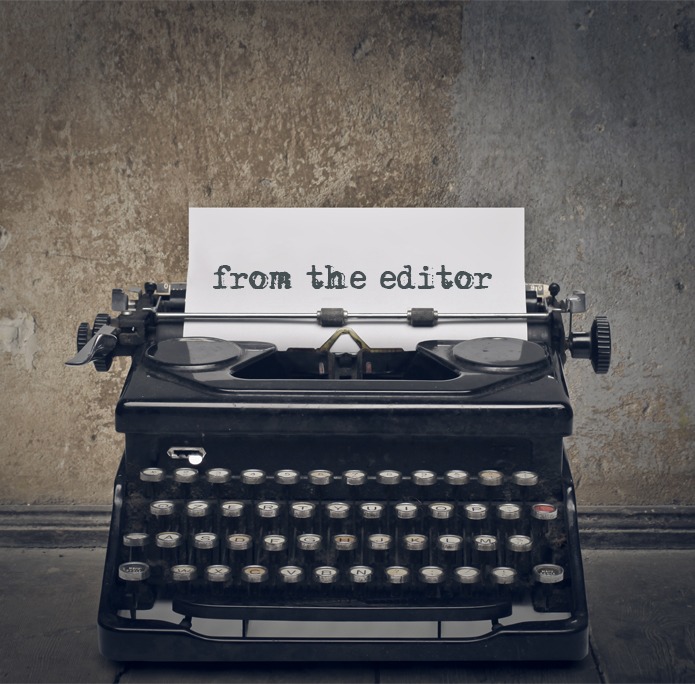While I have been formally introduced to the readership of Open Shelf since I began my stint as Deputy Editor, I recently realized I have yet to properly introduce myself (Hello, how are you?) and put a face and personality to the name you see in email responses from the Open Shelf email address.

The Future Now – The Royal Society of Canada Report
Impressive. Important. Urgent. The Royal Society of Canada Expert Panel report on the future of libraries and archives was released November 13 (The Future Now: Canada’s Libraries, Archives, and Public Memory) and it is a must read.
“The air of crisis acknowledged repeatedly by researchers concerned about vanishing and undervalued national, cultural resources coincided with a time of re-imaging and re-locating libraries and archive institutions as centres of community, human experience, and possibility … we heard both despair and excitement.” RSC Report.
Why is this report important?
 First, and perhaps most importantly, the report provides an exceptional Canada-wide, sector-wide, review of libraries and archives and how we got to the state we are in. Like me, you will probably learn a lot about institutions you thought you knew well.
First, and perhaps most importantly, the report provides an exceptional Canada-wide, sector-wide, review of libraries and archives and how we got to the state we are in. Like me, you will probably learn a lot about institutions you thought you knew well.
Secondly, it strongly focuses on two key weakness: the diminished role of the federal government and the abdication of Library and Archives Canada (LAC). Its recommendations for the former will likely fall on deaf ears; its recommendations for the latter are strong, strategic, and actionable.
Thirdly, it urges libraries and archives to break through the barriers that divide us (jurisdiction, sector, geography, history, philosophy, personalities) and work together more effectively in support of our essential mandates and values. Sticking together to lead and thrive, not just survive, is a clear priority.
The panel is bold in the implications of this:
“One clear and consistent message has emerged: the necessity of doing almost everything differently.”
While reviewing a litany of issues and critical challenges, the report is particularly concerned about the precarious state of school libraries and learning commons. The Report is emphatic on this point, calling school libraries “the Canadian library priority of the moment.”
The recommendations for associations, particularly the Canadian Library Association, should be welcomed by all. Despite their abundance (and resulting fragmentation), these associations do great work for libraries and archives. The alphabet soup of CLA, CARL, CRKN, OLA, AAQ, BCLA, ACA, etc. etc. obscures how valuable they are as voices and enablers in our community.
Are there shortcomings? Of course. But this is a broad, big picture view of libraries and archives. It is not so much about omissions as degrees of emphasis. Some issues get more attention than others; some recommendations are more specific than others.
This report is ostensibly about the future but it does not prognosticate too far ahead. As a result it is very much about the past (in a good way), a lot about the present (in a clear way), and only modestly about the future.
While acknowledging that what binds librarians and archivists together is a focus on “information”, the report does not explore the future of information. That future is about digital, disembodied, networked, and semantically-aware information. It is less about discovery tools, Trusted Digital Repositories (TDRs) or video game interfaces to document systems than it is about intelligent, network-aware, computing that will act as agents on our behalf (finding, organizing, sense making). David Weinberger’s Too Big To Know provides a clear and provocative view of that essential future.
Don’t let the important work of preserving print and book culture isolate us from the dramatic advances in computing that will soon make our current infrastructures seem quaint indeed. Librarians and archivists need to work with leading edge computing scientists as much as they do with each other and current technology providers.
However, the bottom line is clear: read the report and assess how you and your organizations can influence and operationalize the relevant recommendations.
The Royal Society of Canada panel has lit the flame, the library and archival community must now pick up the torch and go forward together.
Cheers, Mike Ridley
Editor-in-Chief, Open Shelf
From the Editor is a regular column from the Editor-in-Chief of Open Shelf. The views express here and throughout the magazine do not necessarily reflect the views of the Ontario Library Association or its members.
